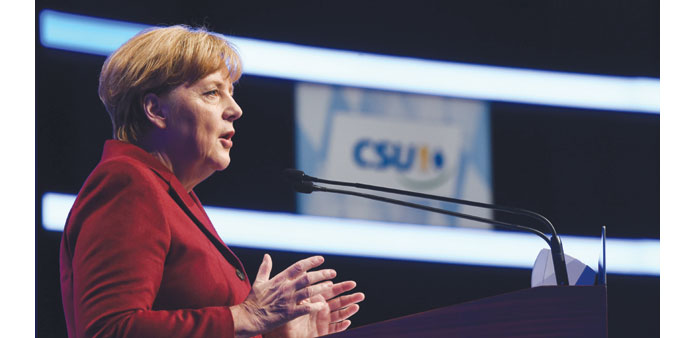Merkel: we have to put all our efforts into a European, international solution.
DPA
Berlin
Chancellor Angela Merkel has defended her handling of Germany’s refugee crisis in an address to the annual congress of her key political ally, the Christian Social Union (CSU), rejecting limits on the numbers of asylum seekers entering Germany.
She insisted an international solution was needed to reduce refugee numbers in the long run.
The “mega challenge” had to be resolved in such a way that the European Union would not be harmed, Merkel told the more than 1,000 CSU delegates who had gathered in Munich.
“If we want that, we have to put all our efforts into a European, international solution,” she said.
Merkel suggested among others a protection of the EU’s external borders and an agreement with Turkey on legal migration.
“This is the kind of approach to reduce refugee numbers – as opposed to a national limit – that will allow us to act in everyone’s interest,” she added.
Bavarian Premier and CSU leader Horst Seehofer had earlier set the tone for the party conference by again calling for limits on the number of refugees to be taken in by Germany shortly before the chancellor was due to speak at the congress in Munich.
“However you look at it, there is no other way than to introduce a limit or a ceiling,” said Seehofer whose party is the arch-conservative ally of Merkel’s Christian Democratic Union (CDU).
Yesterday CSU delegates had voted in favour of an upper limit.
However, no CSU representative has so far put a clear figure on it.
The party’s secretary general, Andreas Scheuer, spoke of an “emigration of nations” which would not stop “at the gates of Europe”.
Merkel’s decision in September to open Germany’s borders to refugees fleeing conflict in Africa and the Middle East has triggered tensions between the chancellor and CSU leaders.
The chancellor has repeatedly rebuffed calls from CSU leaders to place an upper limit on the number of refugees entering Germany, which in recent weeks was about 10,000 a day.
More recently, Merkel has focused on measures to curb the stream of refugees into the country as well as ensuring that those without a legitimate claim for asylum are returned to their homelands as quickly as possible.
Bavaria has emerged as a frontline line state as thousands of asylum seekers streaming across its border each day after making the trek north from southern Europe.
Since the start of the year more than 900,000 refugees have been registered in Germany, according to Bavarian Interior Minister Joachim Herrmann.
Seehofer has in the past described Merkel’s open-arms policy for refugees as “a mistake”.
State governments and volunteers have also complained that their resources have been stretched to the limit by the influx of newcomers.
The CSU conference is to be followed next month by the annual conference of Merkel’s CDU, where her stance on refugees has also come under fire from certain sections of the party.
In the aftermath of November 13’s deadly terrorist attacks on Paris, the fight against global terrorism is also expected to be high on the CSU convention agenda.
The CSU party conference opened with a minute’s silence for the victims of the attacks.
Many analysts see the tensions between Merkel and the CSU as contributing to the recent slide in support in opinion polls for the CDU-CSU bloc.
Nevertheless, the chancellor received a friendly welcome at the party conference yesterday, with delegates greeting her with applause, although there were also individual whistles from the audience.
A key concern for the CSU is that some of its voters could be drawn away from the party to the anti-foreigner Alternative for Germany (AfD), which has picked up in opinion polls as the refugee drama has unfolded.

